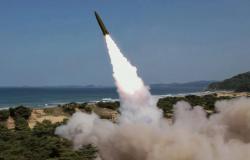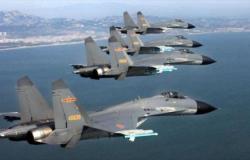Faced with the growing threat from China in the Indo-Pacific region, the US seeks to approve in Congress the financing of new military aid to Taiwan and the Philippines with the aim of improving their defense systems.
The bill to counter China
Republicans on the House Appropriations Committee this week released a State Department spending bill for fiscal year 2025, with sections demonstrating continued U.S. interest in countering China’s advance in the region. of the Indo-Pacific.
In recent years, the foreign policy of the Chinese regime has shown an increasingly assertive nature towards the countries of Southeast Asia, in particular with whom it maintains a series of territorial disputes around the South China Sea.
Given this, despite the fact that the Democratic Party argues that the bill underfunds the State Department and the United States Agency for International Development, solid bipartisan support has been generated for increasing military aid abroad. for both the Philippines and Taiwan.
The bill, which is $12 billion less than the Biden administration’s State Department budget request for fiscal year 2025, would reduce overall funding by 6%. At the same time, it allocates $100 million in Foreign Military Financing (FMF) for the Philippines and another $500 million for Taiwan.
However, the allocation for the Philippines and Taiwan under the Foreign Military Financing Program is well above the State Department’s fiscal year 2025 budget request, which called for $42.2 billion in FMF for the Philippines and $100 million dollars for Taiwan.
The FMF program provides U.S. allies and partners with cash assistance to purchase defense equipment, training, and services to ensure they can work together toward common security goals, in this case, the China threat in the region.
“The legislation makes clear that we will not retreat from the cause of freedom” House Appropriations Chairman Tom Cole, R-Okla., said during discussion of the bill Tuesday. Furthermore, he added that the project “confronts the growing advance of hostile regimes by countering the influence of communist China in the Indo-Pacific region and the intimidation of Taiwan and our other partners in the area”.
On the Scarborough Shoal of the South China Sea, the Chinese Coast Guard attacked Philippine fishing vessels in late April and, following the inauguration of Taiwan’s new president, Lai Ching-te, China began a shocking exercise military around the island he claims as his own.
US alliances in the Pacific
The increasing aggressiveness of China’s actions in the region is causing the United States to pay more attention and grant FMF to those countries that need it, such as the Philippines and Taiwan, to counter its growing competitor. Furthermore, with the same objective of deterring the Asian giant, the US has resorted to different partnerships with Indo-Pacific allies.
Such is the case of the Enhanced Defense Cooperation Agreement between the US and the Philippines, signed in 2014, through which joint military exercises called “Balikatan” have been intensified.

The word Balikatan means “shoulder to shoulder,” and such exercises have been consensual in the territorial defense that the Philippines needs to improve. In addition to this, the agreement allows the US to deploy troops and finance the improvement and construction of Philippine military bases. As of 2023, 10 sites will be built under this agreement.
Other legislation the United States has passed to counter China’s influence in the Indo-Pacific includes the foreign aid bill, approved by Congress in April of this year. That bill includes $2 billion in foreign aid funds for Taiwan and other allies who are “confronting Chinese aggression,” as well as 1.9 billion dollars for the transfer of weapons to Taiwan from US arsenals.
You may be interested: In the midst of tensions with the US, the Russian Navy frigate Almirante Gorshkov has arrived in Cuba to participate in military exercises
Source: Defense News







